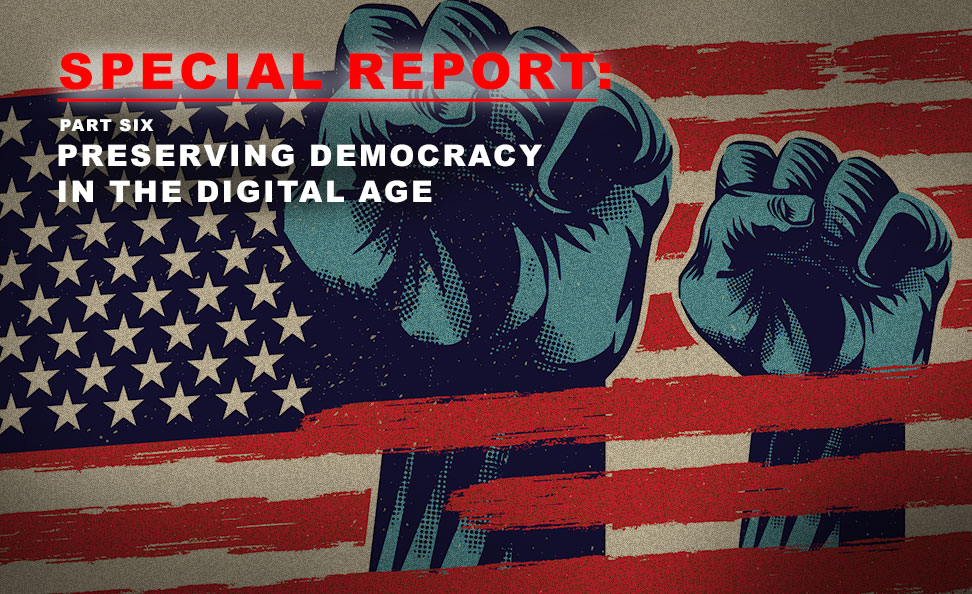Forget aluminum foil hats, mind-reading technology is here, and it could be peering into your deepest, darkest secrets – is this the future of privacy or a sci-fi nightmare?
Imagine someone being able to listen to your every thought, and not just the ones you mutter under your breath while in the grocery store line. Mind-reading technology is no longer science fiction, and with it comes the terrifying possibility that our most private selves are no longer truly private.
This technology, while holding promise for medical applications, raises major privacy concerns and opens the door to a whole new level of intrusion – one that could, for example, make even the most secure password seem laughable. But it also raises serious concerns about who gets to control your thoughts and whether new laws like Canada’s Bill C-63 foreshadows a world where even thinking the “wrong” thing is a crime that can result in a prison life sentence.

Imagine being able to control your computer with your thoughts, or helping a loved one with locked-in syndrome communicate their desires. These are just a few potential applications of mind-reading technology, a rapidly developing field that promises to bridge the gap between our brains and the external world. But before we get swept away in a futuristic daydream, let’s delve into the nitty-gritty of how this technology actually works.
One of the main approaches to mind-reading utilizes a tool familiar from doctor’s visits: electroencephalography (EEG). This technique measures the electrical activity generated by millions of neurons firing in your brain. Think of it like listening to a symphony orchestra – you can hear the overall melody, but it’s difficult to pinpoint the exact instrument playing each note. EEG works similarly. It places electrodes on your scalp to detect these electrical currents, providing a high-resolution picture of when brain activity changes. However, the exact location of that activity within the brain (the “which instrument”) remains blurry.
Here’s an analogy: Imagine a crowded movie theater. By monitoring the overall noise level, you can tell when the audience laughs or gasps. This is similar to EEG – it detects changes in overall brain activity. However, you wouldn’t know exactly where in the theater the laughter originated, or who was gasping. That’s the limitation of EEG – it offers a broad picture of when things happen in your brain, but struggles to pinpoint where.
Another mind-reading contender is functional magnetic resonance imaging (fMRI). This powerhouse technology uses powerful magnets and radio waves to create detailed, 3D images of your brain activity. Think of it like having a highly-trained conductor point out exactly which instruments are playing in the orchestra at any given moment. fMRI provides excellent spatial resolution, allowing researchers to pinpoint the specific brain regions activated during different tasks.
However, fMRI comes with its own set of limitations. Unlike EEG, which is relatively portable and affordable, fMRI requires lying still inside a large, expensive machine. Furthermore, fMRI has lower temporal resolution compared to EEG. While it can tell you which brain regions are active, it can’t capture the rapid-fire changes in brain activity that occur within milliseconds.
In essence, EEG and fMRI offer a trade-off. EEG is like a fast-paced news feed, giving us a real-time snapshot of overall brain activity. fMRI, on the other hand, is like a detailed map, pinpointing the specific locations where activity is happening. By combining these approaches and employing machine learning, researchers are making significant strides in deciphering the complex language of our brains.
While the concept of mind-reading might seem like something ripped from a sci-fi movie, several organizations are actively developing this technology. Two key players are currently leading the charge:
University of Texas at Austin: These researchers are cracking the brain code with a “semantic decoder.” Think of it as a translator for your thoughts, using fMRI scans and machine learning to convert brain activity into words. Imagine helping those with communication challenges finally express themselves!
Facebook’s Meta: The social media giant is taking a different approach. Their EEG tech focuses on predicting what you’re looking at. While this could enhance virtual reality, it also raises privacy concerns. Could they track our every online glance and bombard us with targeted ads?
The race for mind-reading is on, balancing innovation with the need to protect our privacy. As the technology evolves, open discussions and regulations are crucial to ensure it’s used ethically.
A Double-Edged Sword: The Potential and Peril of Mind Reading Technology
The wonderful potential of mind reading technology means that someone paralyzed by ALS can finally communicate their thoughts and desires. Or, a child with severe autism can express their needs and feelings. These are just a few of the promising applications of mind-reading technology in the field of healthcare. By deciphering brain activity, researchers hope to develop new communication channels for people with disabilities, offering them a much-needed voice.
The potential extends beyond communication. Mind-reading technology could revolutionize education. Imagine a learning environment that adapts to your brain’s natural learning style, or personalized training programs that identify areas needing improvement based on real-time brain activity. This technology could also be a boon for medical diagnostics. By analyzing brain activity patterns, doctors might be able to detect early signs of neurological disorders or mental health conditions, leading to faster diagnosis and treatment.
However, the potential benefits of mind-reading technology come hand-in-hand with a much darker side.
In the wrong hands, this technology could be used for nefarious purposes. Consider the world of targeted advertising. Imagine browsing the web, only to be bombarded with ads based on your subconscious desires – desires you might not even be aware of. Companies could potentially exploit mind-reading technology to manipulate consumer behavior in unprecedented ways.

The potential for misuse extends beyond the commercial sector. Governments with authoritarian tendencies could use mind-reading technology to monitor political dissidents or anyone deemed a threat. Canada’s new Bill C-63 stands as a shining example. Imagine a world where your innermost thoughts could be used against you, stifling free speech and dissent with the threat of life-time imprisonment.
The chilling prospect of thought control becomes a frightening reality.
The ethical considerations surrounding mind-reading technology are complex and far-reaching. While the potential to improve lives is undeniable, the risk of privacy violation and manipulation is a serious concern. As this technology continues to evolve, it’s crucial to establish clear regulations and ethical frameworks to ensure responsible development and prevent its misuse. The future of mind-reading technology hinges on a delicate balance – harnessing its potential for good while safeguarding our fundamental right to privacy.
Privacy Concerns: How Mind Reading Technology Threatens Your Right To Privacy
Privacy isn’t just about keeping your diary under lock and key. It’s a fundamental right enshrined in numerous legal and ethical frameworks. It allows us to control the flow of information about ourselves, fostering trust and open communication. Picture living in a world where your every conversation is overheard, your every email scrutinized. This is the potential future we face if mind-reading technology isn’t carefully managed.
Unlike traditional data breaches where passwords and encryption can offer some protection, mind-reading technology bypasses these safeguards altogether. Your thoughts, the most intimate aspect of your being, become vulnerable. A hacker can steal not just your credit card information, but your deepest fears and aspirations. The potential for exploitation is immense.
Furthermore, unlike our actions or online activity, we have very little control over our thoughts. They flit through our minds, fleeting and often subconscious. Mind-reading technology raises a chilling question: Do we truly own our own thoughts? The prospect of someone else peering into the deepest recesses of our minds, judging us based on fleeting moments or subconscious biases, is a horrifying prospect.
This potential for intrusion has a chilling effect on free thought. If we know someone can read our minds, will we be less likely to explore controversial ideas or hold dissenting opinions? Will the fear of judgment stifle creativity and innovation? A society where free thought is discouraged is a society that stagnates. And we’re already living in a society where wrong-speak is severely punished. Are you really free today to express what you truly believe, or do you just play it safe and go with the status quo?
The threat goes beyond individual privacy. In the future, political dissenters can be monitored and controlled based on their brain activity. Or employers can screen potential candidates based on their subconscious biases. Mind-reading technology could usher in an era of unprecedented social control, eroding the very foundations of a free and open society.

The potential for misuse by law enforcement is particularly concerning. Imagine a world where police can use mind-reading technology during interrogations, blurring the lines between voluntary confession and coerced thought extraction.
Or how about roadside sobriety checks where mind reading technology raises serious questions about probable cause and the right to privacy. Could a fleeting thought about having a drink with dinner hours ago be misconstrued as intoxication? The line between legitimate investigation and intrusive thought-scanning becomes worryingly thin. Law enforcement’s use of mind-reading technology will require strict guidelines and oversight to prevent its use for fishing expeditions into people’s minds and to safeguard the rights and privacy of all citizens.
Furthermore, profiling based on brain activity could lead to discriminatory practices, with biased interpretations of neural patterns leading to false positives and unnecessary suspicion. The right to remain silent, a cornerstone of legal protection, could become obsolete if our very thoughts can be used against us.
This isn’t science fiction anymore. The rapid development of mind-reading technology demands immediate action. We need open discussions about the ethical implications of this technology. Strong regulations are crucial to ensure its responsible development and prevent its misuse for mass surveillance or thought control.
The future of privacy hinges on striking a delicate balance – harnessing the potential of mind-reading technology while safeguarding our fundamental right to privacy and the freedom of our thoughts. This is more than just a technological challenge; it’s a battle for the very essence of human autonomy and free will. It’s a fight to ensure our minds remain our own private sanctuaries, not open books for anyone to read.
A Chilling New Precedent: Canada’s New Bill C-63 and the Future of Thought Control
Across the border, Canada’s recent Bill C-63, also known as the Online Harms Act, has sparked heated debate. The bill aims to combat online hate speech, an undeniably noble goal in itself.
However, critics are deeply troubled by the vagueness of its language, which could potentially criminalize thoughts, and result in life sentences in prison. Someone suspected of harboring hateful or offensive thoughts could face the maximum penalty for the underlying crime they never committed, including life imprisonment. In essence, Bill C-63 sets a dangerous precedent, criminalizing thought itself based on perception rather than concrete action.

This is not just a hypothetical concern. Critics point out that Bill C-63 effectively allows authorities to punish people based on their perceived motivations, which can be notoriously difficult to prove.
The potential for abuse is immense, as law enforcement could interpret someone’s online activity or even their brain activity (should mind-reading technology become more sophisticated) as harboring “hateful thoughts,” leading to severe consequences.
Canada is not alone in its efforts to regulate online speech. Several countries have enacted similar laws, often with ambiguous definitions of what constitutes harmful content. These efforts, while aiming to create a more civil online environment, can inadvertently stifle free expression and dissent.d
The development of mind-reading technology demands a renewed focus on the importance of protecting free speech. This right is not just about protecting popular or comfortable ideas; it’s about safeguarding the space for unpopular, controversial, and even offensive thoughts. Without this freedom, societies stagnate and innovation dries up.
Wrap Up – Safeguarding Our Minds in the Digital Age
The potential of mind-reading technology is undeniable, but its development can’t come at the expense of our privacy. We stand at a crossroads. This technology can revolutionize healthcare and communication, but it also carries the chilling potential for misuse.
Strong regulations and clear ethical guidelines are crucial. We need safeguards to prevent mind-reading technology from becoming a tool for mass surveillance, thought control, or corporate manipulation. The privacy of our thoughts is a cornerstone of a free society, and we must act now to ensure it remains protected in the digital age. The future of mind-reading technology hinges on striking a delicate balance – harnessing its potential for good while fiercely safeguarding our fundamental right to think freely and live privately.
But will we be the ones doing the thinking, or will the technology be reading our minds and dictating our futures? The choice is ours, and the clock is ticking.








